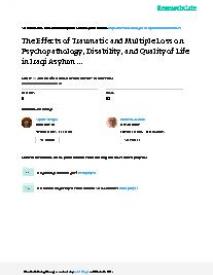The Effects of Traumatic and Multiple Loss on Psychopathology, Disability, and Quality of Life in Iraqi Asylum Seekers in the Netherlands
Emerging evidence suggests that the loss of loved ones under traumatic circumstances is highly prevalent among refugees and asylum seekers.
We evaluated the effects of traumatic and multiple losses of family members and friends on psychopathology, disability, and quality of life in Iraqi asylum seekers in the Netherlands, and investigated mediation of these effects through psychopathology.
Respondents (N = 294) completed structured Arabic interviews.
Data were analyzed using structural equation modeling.
The loss of a loved one was reported by 87.6% of the sample.
Traumatic and multiple losses of family members independently predicted psychopathology, taking the effects of other traumatic events, postmigration stressors, and sociodemographic characteristics into account.
Effects of traumatic and multiple losses on quality of life and disability were either partially or fully mediated by psychopathology.
These findings highlight the need to evaluate and treat the effects of the loss of loved ones when working with asylum seekers and refugees as well as to incorporate grief-related psychopathology in diagnostic classifications.
Geachte bezoeker,
De informatie die u nu opvraagt, kan door psychotraumanet niet aan u worden getoond. Dit kan verschillende redenen hebben,
waarvan (bescherming van het) auteursrecht de meeste voorkomende is. Wanneer het mogelijk is om u door te verwijzen naar de bron
van deze informatie, dan ziet u hier onder een link naar die plek.
Als er geen link staat, kunt u contact opnemen met de bibliotheek,
die u verder op weg kan helpen.
Met vriendelijke groet,
Het psychotraumanet-team.
In: Journal of Nervous & Mental Disease, ISSN 0022-3018 | 206 | 1 | January | 52–60
http://doi.org/10.1097/NMD.0000000000000750


